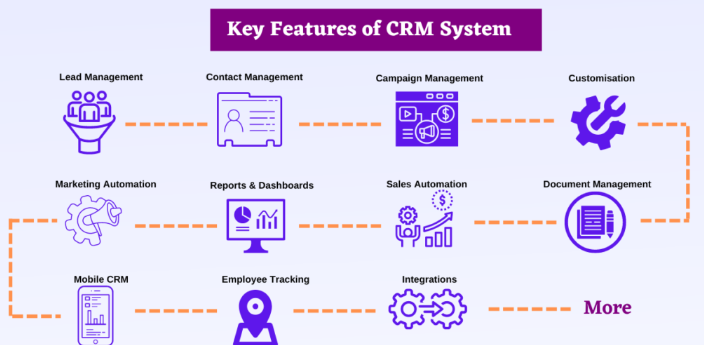In today’s competitive business landscape, small businesses are continuously seeking ways to improve their operations, enhance customer relationships, and drive growth. One of the most effective tools available to achieve these goals is Customer Relationship Management (CRM) software. While many people associate CRM systems with large enterprises, small businesses can benefit immensely from implementing CRM solutions. This article outlines seven key benefits of CRM for small businesses and how these tools can help them thrive.

1. Improved Customer Relationships
At the core of any successful business is its relationship with customers. A CRM system helps small businesses manage customer interactions and data effectively, leading to stronger relationships.
- Centralized Customer Information: CRM systems store all customer information in a single database, making it easily accessible to employees. This centralized approach ensures that sales and support teams have all the relevant data at their fingertips, enabling them to understand customer needs better.
- Personalized Communication: With detailed customer profiles, businesses can personalize their communication. By knowing customers’ preferences, purchase history, and interactions, small businesses can tailor their marketing messages and offers, leading to increased customer satisfaction.
2. Enhanced Sales Processes
CRM systems streamline sales processes, making it easier for small businesses to manage leads and close deals.
- Lead Management: CRM solutions help small businesses track leads through the sales funnel. From initial contact to conversion, CRM systems allow businesses to manage leads effectively, ensuring no opportunity is missed.
- Sales Automation: By automating repetitive tasks, such as sending follow-up emails or reminders, CRM systems free up valuable time for sales teams to focus on building relationships and closing deals.
Also Read : 5 Proven Strategies to Maximize CRM Effectiveness
3. Better Data Analysis and Reporting
Data-driven decision-making is essential for any business, and CRM systems provide powerful analytics and reporting tools that help small businesses understand their performance.
- Key Performance Indicators (KPIs): CRM software allows businesses to define and track KPIs, such as sales growth, customer retention rates, and lead conversion rates. These metrics enable small businesses to assess their performance and identify areas for improvement.
- Forecasting: With historical data and trends available through CRM systems, small businesses can forecast future sales and make informed decisions about resource allocation and strategic planning.
4. Increased Efficiency and Productivity
Efficiency is crucial for small businesses that often operate with limited resources. CRM systems enhance productivity by streamlining workflows and reducing administrative burdens.
- Task Management: CRM software enables teams to assign tasks, set deadlines, and track progress. This organization leads to improved accountability and ensures that everyone is aligned with their responsibilities.
- Automated Workflows: Many CRM systems offer automation features that can streamline processes. For example, automatic lead assignments based on specific criteria can help ensure that the right team member handles each opportunity.
5. Improved Customer Service
Excellent customer service is a differentiating factor for small businesses competing with larger enterprises. CRM systems empower small businesses to provide top-notch customer support.
- 24/7 Support Access: Many CRM platforms include features like chatbots or automated responses that allow customers to get assistance even outside of business hours. This accessibility enhances the customer experience and builds trust.
- Case Management: CRM systems enable businesses to manage customer inquiries and support tickets effectively. By keeping track of customer interactions and issues, small businesses can respond quickly and resolve problems efficiently.
6. Enhanced Collaboration Among Teams
In small businesses, collaboration is essential for success. CRM systems facilitate communication and cooperation among different teams, such as sales, marketing, and customer support.
- Shared Access: With a centralized database, all teams can access customer information, allowing for better coordination. This shared knowledge enables teams to work together effectively to achieve common goals.
- Interdepartmental Communication: CRM systems provide tools for internal communication, such as notes, comments, and task assignments. This functionality helps teams stay informed about customer interactions and maintain a consistent approach.
7. Scalability and Growth
As small businesses grow, they need systems that can scale with them. CRM solutions offer the flexibility and scalability necessary to support expanding operations.
- Flexible Features: Most CRM systems allow businesses to add features and functionalities as their needs evolve. Whether it’s adding new users, integrating additional tools, or expanding reporting capabilities, CRM solutions can grow with your business.
- Support for Expansion: When small businesses expand into new markets or launch new products, CRM systems provide the insights and analytics necessary to navigate these changes effectively. With comprehensive customer data, businesses can tailor their strategies to meet the demands of new audiences.
Conclusion
Implementing a CRM system offers numerous benefits for small businesses, from improving customer relationships and enhancing sales processes to increasing efficiency and supporting growth. By investing in CRM technology, small businesses can streamline their operations, gain valuable insights, and deliver exceptional customer experiences that drive loyalty and success. In a world where customer expectations are higher than ever, CRM solutions provide the tools necessary for small businesses to compete and thrive.
As the business landscape continues to evolve, leveraging the capabilities of a CRM system becomes not just a competitive advantage but a necessity for small businesses aiming for long-term success.